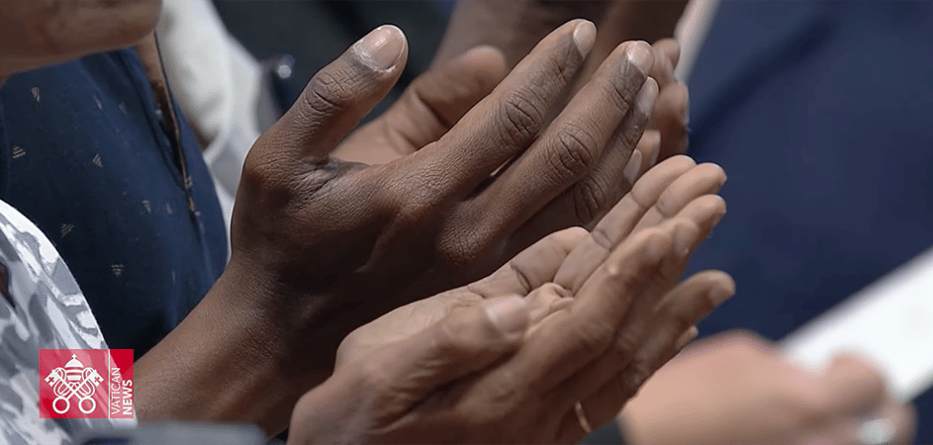Throughout the remainder of this liturgical year, we will hear predominantly from Saint Luke’s Gospel in the Sunday Masses. As the only Gentile author in the New Testament, his perspective and emphases are different from the other gospel writers.
Only Saint Luke, for example, recalls certain events or teachings from the Lord Jesus. Among these is the story of the Good Samaritan, which we heard last Sunday at Mass. It also includes the intriguing story of the two sisters Martha and Mary. Why Luke chose to include this encounter in his gospel book is uncertain, but it contains a valuable lesson for us today.
As we try to discern this lesson, it might help us to recall some of the details of the Lord’s visit to Martha and Mary.
The Lord Jesus comes to their home as a guest. The two sisters are serving as hosts. Mary sits at his feet, while Martha is busy with the tasks of a hostess. Martha eventually complains to the Lord that her sister should help her, but the Lord tells Martha that she worries about too many things and that Mary has chosen the better part.
At face value, it’s an odd story. Why wouldn’t Martha just tell Mary to get up and help her? Why wouldn’t the Lord take the side of the sister who is laboring to provide warm hospitality?
The approach Martha takes and her exact wording is very insightful. Martha does not call her sister into the kitchen and seek to speak to her privately. She does not attempt a charitable reminder to Mary to help in the work.
Instead, Martha throws her sister under the bus. She attempts to humiliate her in front of the Lord, while simultaneously fueling resentment in her own heart. Martha says to the Lord, “”Lord, do you not care that my sister has left me by myself to do the serving?”
What was the Lord’s interior response to such a stinging question, “Lord, do you not care…?” In his own fatigue, and in his manifested dislike for hypocrisy and pride, we can only imagine Jesus thinking something akin to, “Give me a break! I come into your home to rest and you’re going to pick a fight with your sister and throw a pity-party for yourself?!”
In her overwork, distress, and jealousy, Martha missed the point. She was right, but completely wrong. As the Scriptures show us time and time again, God rejects the proud even when they’re right.
Martha was “burdened” by the preparations surrounding the Lord’s visit, while Mary wasn’t helping either because she was in awe of Jesus’ presence and distracted or perhaps just lazy (or both). Either way, she should have assisted her sister in the necessary details of hospitality.
We know in other situations during his public ministry that the Lord appreciated such gestures and oftentimes praised those who offered these to him, even as he denounced those who did not.
And so, Martha was right. Mary should have helped her. However, when and how this was done could have been negotiated and parceled out between the two sisters. Perhaps Martha’s timing was off, and Mary was being more charitable by greeting and talking with a house guest before making arrangements.
Whatever details could have been discussed or rearranged, Martha’s righteous argument fell flat because of her approach. She displayed rash judgment, vainglory, and was disrespectful in the way she spoke of her sister.
It was Martha’s pride that sunk her petition, and the Lord rightly admonishes her. The Lord’s spoken response is recorded in the Scriptures: “Martha, Martha, you are anxious and worried about many things. There is need of only one thing. Mary has chosen the better part and it will not be taken from her.”
Using contemporary jargon, the Lord was basically telling Martha to “chillax,” to calm down and relax. Why was she so upset and so frazzled? Did she not know that the Lord came as a gracious guest and would not judge her if the house wasn’t immaculately clean or the food perfectly sumptuous?
Mary understood the preciousness of the Lord’s visit. She was willing to let other things wait. She wanted to be with the Lord. The other things would be taken care of in good time, as the Lord taught: “But seek first the kingdom of God and his righteousness, and all these things will be given to you as well.”
And so, as we hear the Lord’s wisdom in his encounter with Martha and Mary, and as we find ourselves stretched with responsibilities and at times thinking, “Lord, do you not care?,” we can be reminded of the valuable lesson of the Lord to Martha: chillax and refocus.
In our own way, we can heed this counsel, reevaluate our approach and internal judgments, seek to find the Lord wherever he is, and show greater patience and charity to those around us.
_______________________________________________
Crux is dedicated to smart, wired and independent reporting on the Vatican and worldwide Catholic Church. That kind of reporting doesn’t come cheap, and we need your support. You can help Crux by giving a small amount monthly, or with a onetime gift. Please remember, Crux is a for-profit organization, so contributions are not tax-deductible.


















